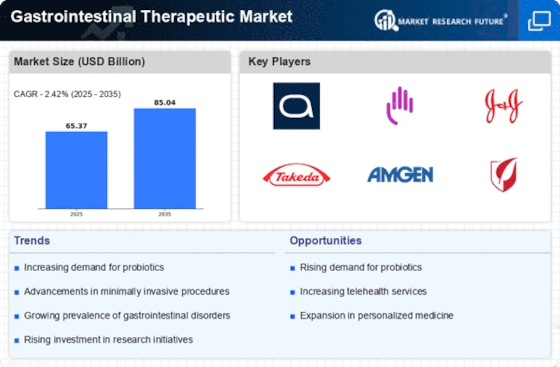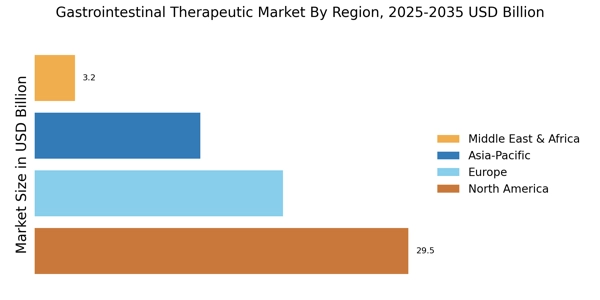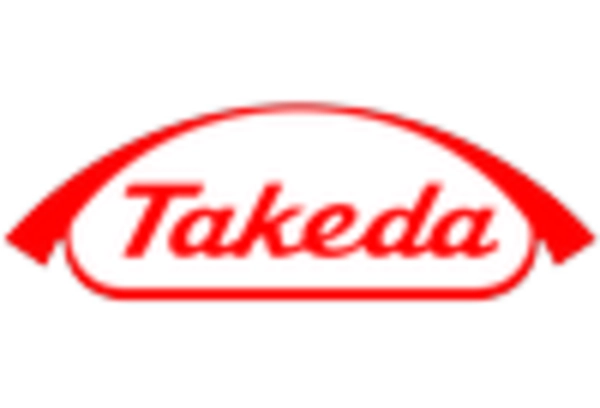Growing Awareness and Education
There is a notable increase in awareness and education regarding gastrointestinal health, which is positively impacting the Gastrointestinal Therapeutic Market. Public health campaigns and educational initiatives have empowered patients to seek medical advice and treatment for gastrointestinal issues. This heightened awareness is reflected in the rising number of consultations and diagnoses, which in turn drives demand for therapeutic interventions. Additionally, healthcare professionals are increasingly prioritizing gastrointestinal health in their practice, leading to improved patient outcomes. As awareness continues to grow, the Gastrointestinal Therapeutic Market is expected to expand, with a focus on preventive measures and early intervention strategies.
Advancements in Drug Development
The Gastrointestinal Therapeutic Market is significantly influenced by advancements in drug development technologies. The emergence of novel therapeutic agents, including biologics and small molecules, has transformed treatment paradigms for various gastrointestinal conditions. For instance, the introduction of monoclonal antibodies has shown promising results in managing inflammatory bowel diseases, leading to increased patient adherence and improved outcomes. Furthermore, the market is witnessing a surge in clinical trials aimed at evaluating new therapies, with over 200 ongoing studies focused on gastrointestinal disorders. This dynamic environment fosters competition among pharmaceutical companies, driving innovation and expanding the therapeutic options available to patients.
Rising Demand for Personalized Medicine
The shift towards personalized medicine is emerging as a significant driver in the Gastrointestinal Therapeutic Market. Tailoring treatments to individual patient profiles, including genetic and biomarker considerations, enhances therapeutic efficacy and minimizes adverse effects. This trend is particularly relevant in the management of gastrointestinal disorders, where patient responses to therapies can vary widely. The market is witnessing an increase in the development of targeted therapies that align with this personalized approach, with several companies investing in biomarker research to identify suitable candidates for specific treatments. As personalized medicine continues to gain traction, the Gastrointestinal Therapeutic Market is poised for growth, reflecting a broader shift towards individualized healthcare solutions.
Regulatory Support for Innovative Therapies
Regulatory bodies are playing a crucial role in shaping the Gastrointestinal Therapeutic Market by providing support for the development and approval of innovative therapies. Initiatives aimed at expediting the review process for new drugs, particularly those addressing unmet medical needs, are fostering a conducive environment for pharmaceutical companies. For example, the designation of breakthrough therapy status for certain gastrointestinal treatments has accelerated their path to market. This regulatory support not only encourages investment in research and development but also enhances patient access to cutting-edge therapies. As a result, the Gastrointestinal Therapeutic Market is likely to experience accelerated growth driven by the introduction of novel treatment options.
Increasing Prevalence of Gastrointestinal Disorders
The rising incidence of gastrointestinal disorders, such as irritable bowel syndrome, Crohn's disease, and ulcerative colitis, is a primary driver of the Gastrointestinal Therapeutic Market. According to recent estimates, approximately 15% of the population experiences some form of gastrointestinal issue, leading to a heightened demand for effective therapeutic solutions. This trend is further exacerbated by lifestyle changes, dietary habits, and an aging population, which collectively contribute to the growing burden of gastrointestinal diseases. As healthcare providers seek to address these challenges, the Gastrointestinal Therapeutic Market is likely to witness substantial growth, with innovative treatments and therapies being developed to meet the needs of affected individuals.

















